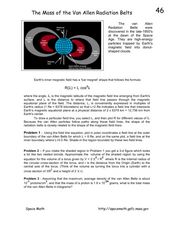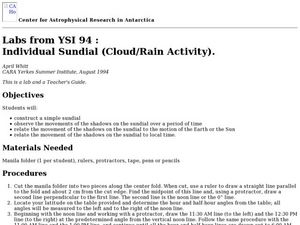Curated OER
Soap Bubble Chemistry
High schoolers investigate soap bubbles. In this soap bubble chemistry instructional activity, students observe a demonstration using pop-it beads to represent a soap molecule. High schoolers produce soap bubbles in the lab by making...
Curated OER
Measure Up!
Students examine parallax and angular measurements. In this investigative lesson students calculate distances of objects and map their results.
Curated OER
The Mass of the Van Allen Radiation Belts
For this van Allen Radiation Belts worksheet, students are given the formula for the field line of the Earth's inner magnetic field. Students use this equation to find the polar coordinates of a field line in the van Allen Belts. They...
Curated OER
Distance And Parallax
High schoolers will determine distances to nearby stars using parallax. In this Astronomy lesson plan, students will use a web program, trigonometry, and sketches to determine the distance of stars.
Curated OER
Why do Stars Rise in the East?
In this stars rise in the east learning exercise, students use geometry to show how the Earth rotates from west to east and why celestial bodies appear to rise in the east and set in the west. Students draw a figure and label given...
Curated OER
Individual Sundial (Cloud/Rain Activity)
Students make a simple sundial to examine the changes in shadows over time. In this sundial and shadow activity, students make a simple sundial out of a manila folder and pencil. They observe how shadows change over time, and relate it...
Curated OER
Motion Capture and Analysis
Students capture the serve motion of a tennis player with a digital or video camera. Using transparencies or a software package, analyze the speed, acceleration, displacement and time of the racquet head and ball in the tennis stroke.






